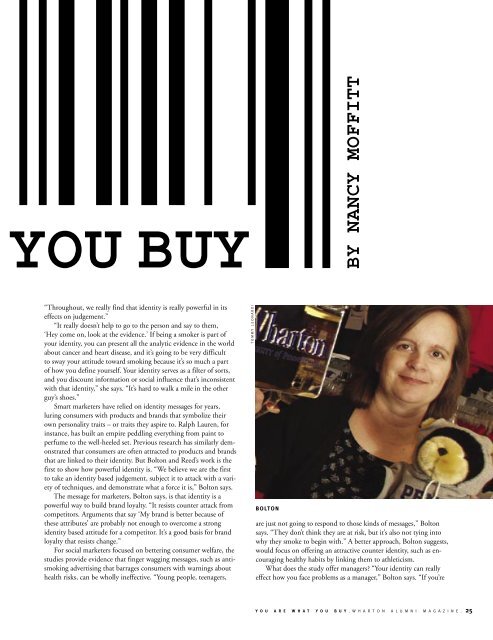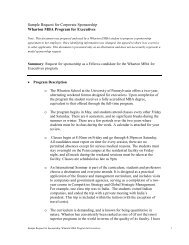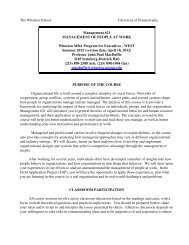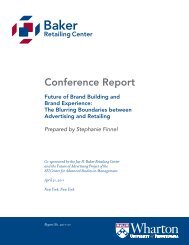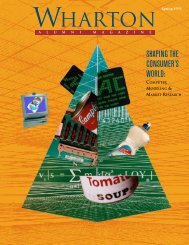Alumni Reunion - The Wharton School of the University of ...
Alumni Reunion - The Wharton School of the University of ...
Alumni Reunion - The Wharton School of the University of ...
You also want an ePaper? Increase the reach of your titles
YUMPU automatically turns print PDFs into web optimized ePapers that Google loves.
YOU BUYBY NANCY MOFFITT“Throughout, we really find that identity is really powerful in itseffects on judgement.”“It really doesn’t help to go to <strong>the</strong> person and say to <strong>the</strong>m,‘Hey come on, look at <strong>the</strong> evidence.’ If being a smoker is part <strong>of</strong>your identity, you can present all <strong>the</strong> analytic evidence in <strong>the</strong> worldabout cancer and heart disease, and it’s going to be very difficultto sway your attitude toward smoking because it’s so much a part<strong>of</strong> how you define yourself. Your identity serves as a filter <strong>of</strong> sorts,and you discount information or social influence that’s inconsistentwith that identity,” she says. “It’s hard to walk a mile in <strong>the</strong> o<strong>the</strong>rguy’s shoes.”Smart marketers have relied on identity messages for years,luring consumers with products and brands that symbolize <strong>the</strong>irown personality traits – or traits <strong>the</strong>y aspire to. Ralph Lauren, forinstance, has built an empire peddling everything from paint toperfume to <strong>the</strong> well-heeled set. Previous research has similarly demonstratedthat consumers are <strong>of</strong>ten attracted to products and brandsthat are linked to <strong>the</strong>ir identity. But Bolton and Reed’s work is <strong>the</strong>first to show how powerful identity is. “We believe we are <strong>the</strong> firstto take an identity based judgement, subject it to attack with a variety<strong>of</strong> techniques, and demonstrate what a force it is,” Bolton says.<strong>The</strong> message for marketers, Bolton says, is that identity is apowerful way to build brand loyalty. “It resists counter attack fromcompetitors. Arguments that say ‘My brand is better because <strong>of</strong><strong>the</strong>se attributes’ are probably not enough to overcome a strongidentity based attitude for a competitor. It’s a good basis for brandloyalty that resists change.”For social marketers focused on bettering consumer welfare, <strong>the</strong>studies provide evidence that finger wagging messages, such as antismokingadvertising that barrages consumers with warnings abou<strong>the</strong>alth risks, can be wholly ineffective. “Young people, teenagers,T O M M Y L E O N A R D IBOLTONare just not going to respond to those kinds <strong>of</strong> messages,” Boltonsays. “<strong>The</strong>y don’t think <strong>the</strong>y are at risk, but it’s also not tying intowhy <strong>the</strong>y smoke to begin with.” A better approach, Bolton suggests,would focus on <strong>of</strong>fering an attractive counter identity, such as encouraginghealthy habits by linking <strong>the</strong>m to athleticism.What does <strong>the</strong> study <strong>of</strong>fer managers? “Your identity can reallyeffect how you face problems as a manager,” Bolton says. “If you’reY O U A R E W H A T Y O U B U Y . W H A R T O N A L U M N I M A G A Z I N E .25


